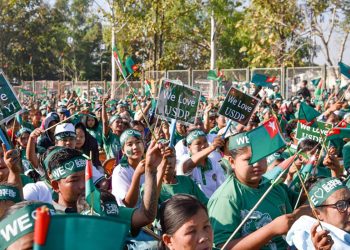NAYPYIDAW — One in five women in Burma have experienced domestic violence, according to the first Myanmar Demographic and Health Survey (MDHS) 2015-16 conducted by Burma’s Ministry of Health and Sports.
The results of the survey—which questioned 12,885 women and 4,737 men aged between 15 and 49 in 12,500 households in 15 divisions and states between December 2015 to July 2016—were reported at an event on Thursday at Horizontal Lake View Hotel in Naypyidaw.
“Rebuking and restricting women from going out, including visiting their relatives, is domestic violence,” Dr. Thet Thet Mu, director of the Public Health Department told the media. “If [men] make [their wives] feel miserable, it is domestic violence.”
“When we asked female respondents about domestic violence, the questions were asked by female interviewers in privacy. If someone came in during the interview, we stopped it right away. We only asked those who agreed to answer,” added the director.
Many women in Burma’s administrative capital Naypyidaw said they are now better informed about domestic violence and which organizations can assist them.
“I saw on television that we can report to organizations like the Myanmar Maternal and Child Welfare Association if we are treated badly. I think most women can endure being poor, but can’t bear being abused,” a housewife in Naypyidaw’s Zabuthiri Township told The Irrawaddy.
Daw Han Su Yin, a housewife from Naypyidaw, agreed that bullying is a form of domestic violence. “If it is not an argument between two sides over a disagreement, but one side is unreasonably berated by the other side, I think it is a kind of domestic violence.”
The first MDHS of Burma was implemented by the Ministry of Health and Sports and funded by United States Agency for International Development (USAID) and Three Millennium Development Goal Fund.
The MDHS collected information on fertility levels, marriage, fertility preferences, awareness and use of family planning methods, breastfeeding practices, nutrition, maternal and child health and mortality, awareness and behavior regarding HIV/AIDS and other sexually transmitted infections, and other health-related issues such as smoking and knowledge of tuberculosis, said the report summary.
The Ministry of Health and Sports plans to conduct the survey every five years and hopes that it will help policymakers to adopt better strategies for the socio-economic development of the country.
Translated from Burmese by Thet Ko Ko.

















